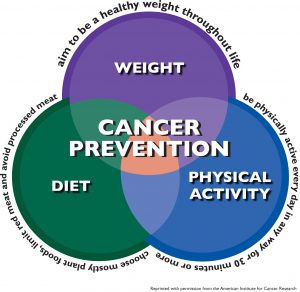Almost one of every two people born today will develop cancer, but more than half of all cancer deaths are preventable, according to a major report released today on the state of cancer progress.
The American Association for Cancer Research (AACR) report estimates that 580,350 Americans will die from cancer this year. More than half of these cancer deaths link to preventable causes, including smoking, obesity, poor diet, drinking alcohol, inactivity, and sun exposure.
This report’s section on preventability aligns with AICR findings that lifestyle matters when it comes to lowering cancer risk.
Decades of funding and analyzing the research on diet, body fat, and physical activity have led to some clear conclusions on cancer prevention and survivorship. AICR estimates that staying a healthy weight, eating a healthy diet, and daily activity can prevent over a third of US cancer cases.
Survivorship is one of the positive findings of the AACR report. Today, more people than ever before are expected to survive the disease. Death rates in the US have dropped for both men and women, the report says, due to early detection and improved treatments. One of every 23 Americans today is a cancer survivor, totaling about 13.7 million US survivors.
Other highlights the report notes include:
– Tobacco use is the top risk factor for cancer: it is responsible for 30 percent of cancer deaths in the US, with smokers 20-times more likely to develop lung cancer than nonsmokers.
– Accumulating evidence suggests that sleep disturbances increase the risk for developing cancer: it could be due in part to the link to obesity and type 2 diabetes.
– Type 2 diabetes not only increases cancer risk, but also reduces short- and long-term cancer survival rates through both direct and indirect mechanisms.
– Viral and other infectious agents cause about 20 percent of cancers worldwide. The human papillomavirus (HPV) is an example that affects the US population, estimated to have caused almost 39,000 new cases of cancer in the US, including cervical cancer.
– Cancer is a global problem: incidence worldwide is predicted to increase from 12.8 million new cases in 2008 to 22.2 million in 2030.
The report includes information on the origins of cancer and a special section on immunotherapy. You can download the full report here.
As the report notes, more research is needed to understand how to help individuals make healthy lifestyle changes. We have ten recommendations on how you can reduce your risk, and we also have launched a (free) New American Plate Challenge for those of you who want to lose weight and get more active.





